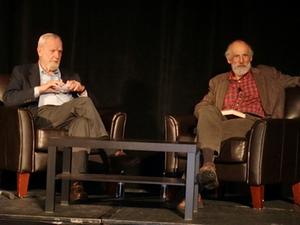
"By definition," said Oldenburg, a virtual connection is "something completely different" in essence and affect than a real third place where people gather and interact outside of the obligations of work and home.
 |
|
|
Sociologist Ray Oldenburg (l.) and Third Place owner Ron Sher. |
|
"The whole American culture has become hostile to third places," said Oldenburg, commenting on what has changed in regard to community since he wrote the book. For example, he said, Chicago once was home to 10,000 taverns and now has only 1,200, and zoning laws have prohibited the construction of gathering places (like pubs) in areas where people actually live. Churches--the most frequent place Americans gather for community--that have grown into mega-places on the side of the highways have found that they serve the community best when they are closer to where people live.
Oldenburg said he has been inspired by Wendell Berry, whom he paraphrased: "All community is local; all else is metaphor." People who think virtual community is community, said Oldenburg, "better rethink it--it's just not true."
Oldenburg listed 11 functions of third places, which range from unifying the neighborhood to providing social support, intellectual forums, strength in numbers and even a place for retired "old coots" to go. He belives that one of the reasons our society is more divided than ever goes back to the loss of a third place for interacting with people of diverse ideas.
"If you connect with people electronically, then you are going to communicate with people who think pretty much as you do," he said. "When we don't get together, we don't become citizens anymore, we become consumers."
Booksellers have reason to hope, he said, because the generation of people who grew up in communities without these gathering places who are now returning to cities to find them.
"Thank God for the regulars," Oldenburg continued, because they are the ones who determine what kind of third place you will have. "Embrace them," he said, because bookstores will become real third places "when your regulars get to know one another." --Bridget Kinsella

